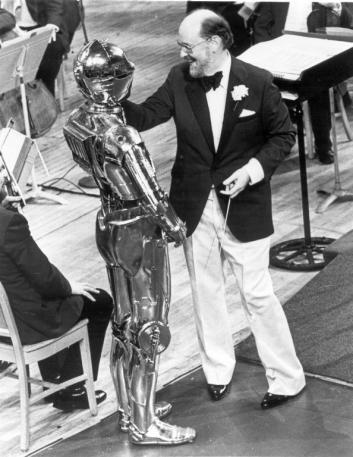In 1980, the Boston Pops hired a new conductor. Succeeding the late Arthur Fiedler was John Williams, who by then already had scored blockbusters like Jaws, Superman, and Star Wars. His first concert leading the famed orchestra featured selections from the soundtrack that he had composed for a certain highly anticipated sequel.
The Empire Strikes Back didn’t hit theaters until May 21, but its music premiered on April 29, the date of Williams’ Symphony Hall debut. This wasn’t just a local phenomenon: “Evening at Pops: Live on Opening Night” aired on PBS. The special gave a national audience clamoring for the second installment of the Star Wars saga a first taste of its score, which featured a song that eventually became synonymous with badassery.
Williams’ iconic score gives the Star Wars movies—presumably including the soon-to-be-released The Force Awakens—an incalculable boost. There’s a reason why the original soundtrack is preserved in the Library of Congress’ National Recording Registry. Played as each film begins, the opening notes of the main theme probably still give you goosebumps. “Just in the first few bars of that music,” said bassist Lawrence Wolfe, who joined the Boston Pops in 1970, “it’s obvious that you’re about to be taken on an epic journey.”
The power of Williams’ music, combined with the nation’s appetite for all things Star Wars, made the April 1980 Boston Pops concert a big deal. The Associated Press reported that the venue “was packed and many in the audience, including women in long gowns and men in black tie, came as much as 90 minutes early to sprawl in the carpeted corridors and on the marble stairs eating box suppers.” According to a Boston Globe article published on April 30, 1980, Mark Hamill flew in from the West Coast for the concert. (Former Supreme Court justice Abe Fortas and movie critic Gene Shalit also were in attendance, but they lacked the star power of Luke Skywalker.)
Preparing for the performance hadn’t been easy. Wolfe said that “The Imperial March (Darth Vader’s Theme)” is particularly challenging. The unrelenting rhythm of the piece put a lot of physical stress on the Pops’ string section, which had to play at a high rate of speed for a lengthy stretch. During rehearsals, Wolfe said, “John would look up at the strings, who had to do that for about five minutes, and say, ‘Sorry.’ ” (Wolfe also recalled that on his sheet music, Vader’s name incorrectly was spelled “Vadar.”)
To illustrate the power of “The Imperial March” to me, Wolfe began humming the melody. You know it: DUN DUN DUN, DUN-DUN DUN, DUN-DUN DUN … But, Wolfe explained, “if that tune was not accompanied by an insistent rhythm, it would sound relaxed. Not relaxing, but somewhat relaxed as opposed to insistent.”
After getting hooked on the thunderous, militaristic anthem and then realizing that the Pops would be the first orchestra to perform it publicly, Wolfe had only one thought: “It was quite simple: holy bleep!”
“The Imperial March” may have been difficult, but performance night went off without a hitch, in spite of some manufactured drama. At one point, Anthony Daniels, in his full metal C-3PO costume, took the baton from Williams and began conducting the orchestra. While the English actor took his job seriously, the task might as well have been ceremonial: Wolfe said that the talented musicians of the Pops were so well prepared that a short time without Williams didn’t throw them off. Not even the presence of what the AP described as “a radio-controlled version” of droid R2-D2 could break their concentration.
The Star Wars spectacle didn’t seem to bother Globe music critic Richard Dyer, who wrote that “in the middle of all of this there was a concert, a pretty good one, and one that paid its tribute to the past while looking to the future.” He called Williams “the real thing” and name-checked the two selections from The Empire Strikes Back: “Yoda’s Theme” and “The Imperial March,” which he deemed “sinister.”
Hamill too was impressed, taking a moment at intermission to tell the Globe: “It’s like a love affair between the orchestra and John. I can’t believe how wonderfully informal this all is. They look like they’re having a lot of fun up there.”
Recorded by the London Symphony Orchestra, The Empire Strikes Back soundtrack album landed on store shelves in May. It eventually earned an Academy Award nomination. Williams spent 13 years as conductor of the Boston Pops. Along the way, he composed one iconic film score after another. “It’s an honor to know him,” said Wolfe, who became principal bassist of the Pops in 1981. “And an honor to play his music. He has my absolute, ultimate respect.”
Meanwhile, “The Imperial March” became hugely popular in its own right. College bands have been playing the ominous song in stadiums and arenas for the last 35 years—both to intimidate weak opponents and to mock powerful ones. The anthem’s longevity doesn’t surprise Wolfe. It was the kind of piece, he said, “that gives you a feeling, a color, and also an afterlife. All the great works of art have an afterlife.”
